Dementia Care in Wimbledon
Relationship-led and supportive Dementia Care in Wimbledon from compassionate and experienced home care professionals.
Enquire about careThe Home Instead Dementia Care home care team, here to help the Wimbledon community
According to Age Well Merton, around 2 in every 100 people aged 65–69 are diagnosed with dementia, with the risk doubling every five years. While many people living with dementia continue to lead independent lives, care needs often increase as the condition progresses. At Home Instead Wimbledon and Kingston, we provide ‘Outstanding’-rated dementia care for older adults in Wimbledon who want to remain independent in the comfort of their own homes. We know no two journeys with dementia are the same, which is why we take the time to understand each person’s needs, preferences, and daily routines. With our personal approach to care, you can feel confident that your loved one can continue enjoying life without leaving home.
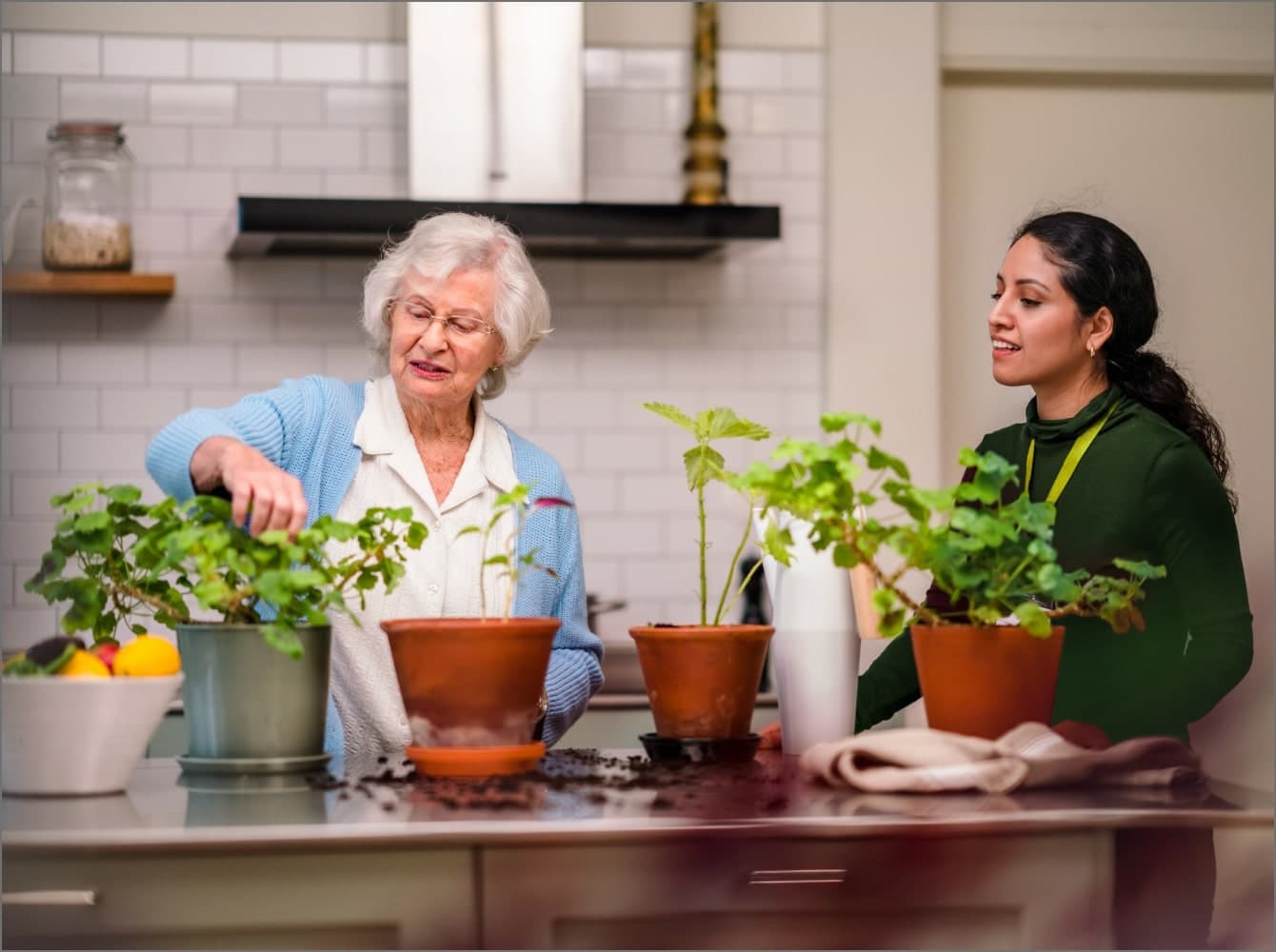
Award-winning service you can rely on


Get in touch today to
see how we can help
Get in touch Why Home Instead Dementia Care may be right for you
Many families in Wimbledon tell us they feel overwhelmed when navigating a dementia diagnosis, unsure where to turn or how to manage changes as they arise. At Home Instead Wimbledon and Kingston, we know how important it is to have the right guidance from the start and ongoing support you can rely on. That’s why, alongside our tailored home care, we offer private consultations with our in-house dementia specialist, Dr. Burnie. Her expert advice helps families understand the condition, prepare for what’s ahead, and feel confident in their decisions. Combined with our flexible, relationship-led care, this added support ensures your loved one receives informed, consistent care that adapts as their needs change; all in the comfort of home.
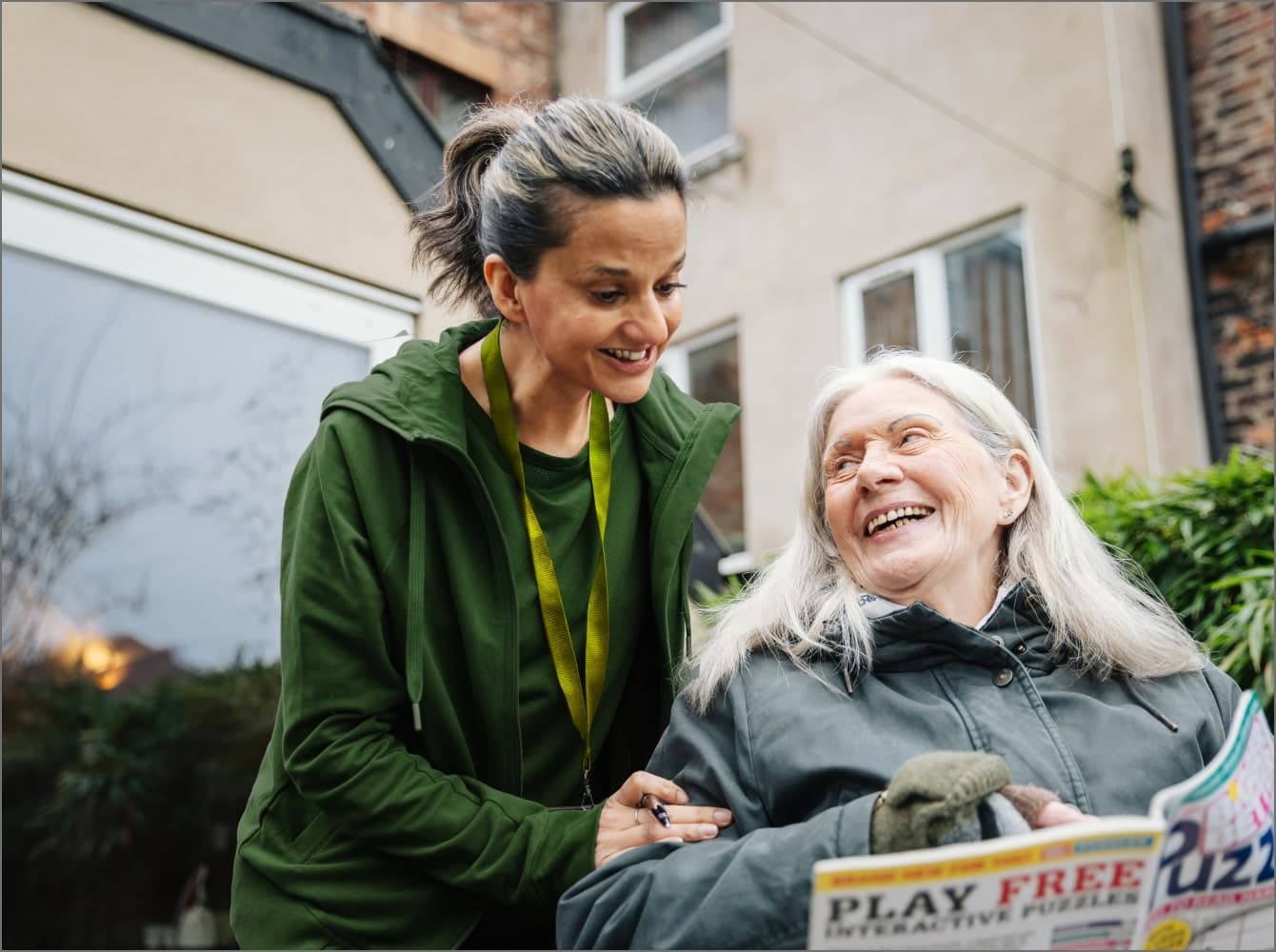
What we do to care for your loved ones
- We carefully match Care Professionals with clients to ensure a meaningful bond is created.
Home help & meal prep
Keeping the home environment clean, safe, and nourishing with home-cooked meals.Personal care
Assistance with bathing, dressing, and personal hygiene, always respecting the dignity of your loved one.Mobility support
Helping your loved one move around their home safely, including transfers and positioning.Health appointment management
We support you to attend those important health appointments.Community engagement
We enable you to continue to do the things you enjoy, be it a visit to the garden centre or your local art group.Transportation
Assistance getting you from A to B, whether it be to go visit a friend or help with your shopping.Medication management
Ensuring medicines are taken correctly and on time, supporting overall health.

Mum has been with Home Instead for 6 years, and is extremely happy with all the caregivers over those years. Without Home Instead, I would not have the same freedom, which is a respite for me.
Lesley A
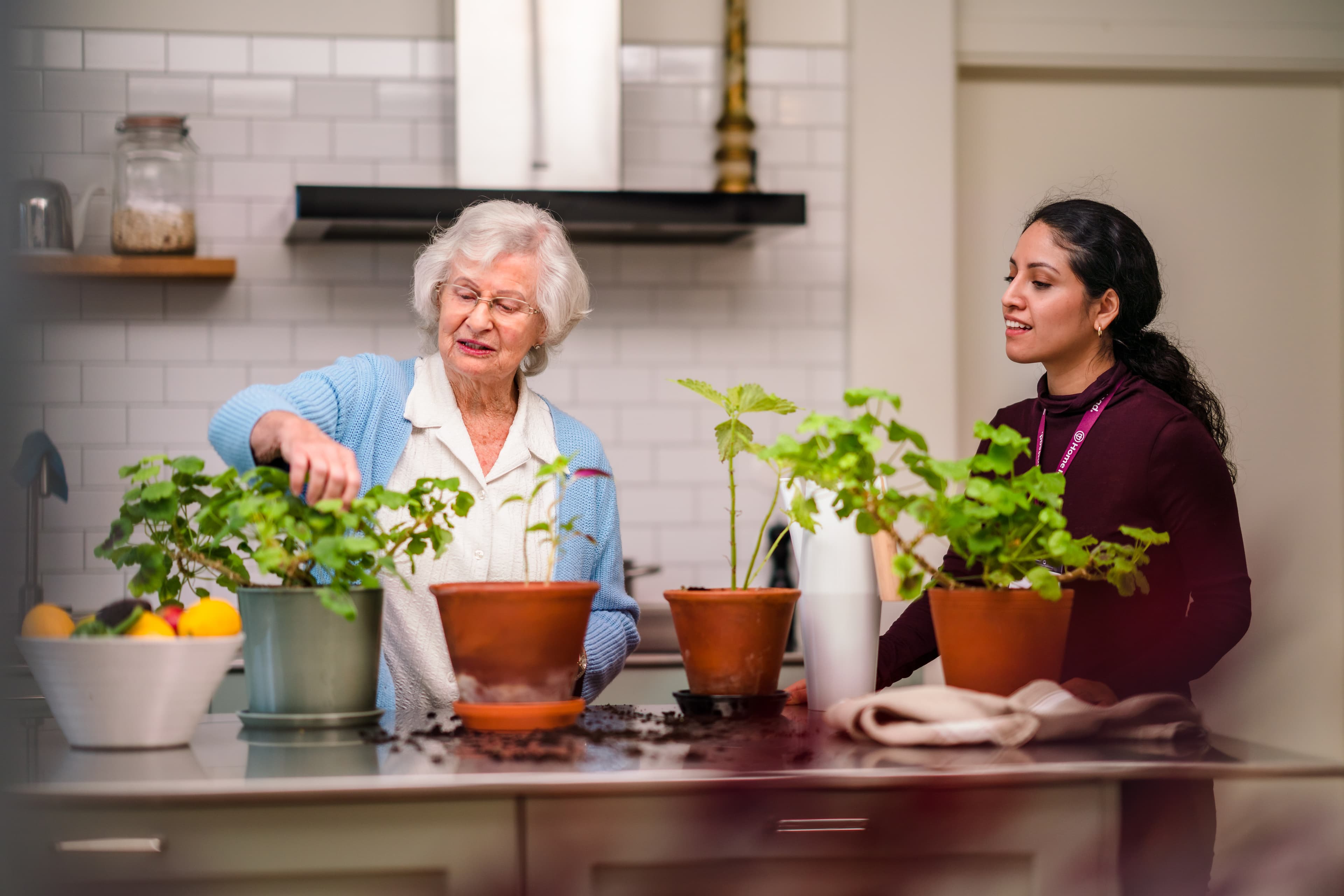
Home Instead have cared for my mother for five years. Her carers have been kind, caring, patient and respectful. I whole heartedly recommend Home Instead to anyone requiring care at home.
Sally D

It has always been the wish of our friend to be able to stay in their own home. Home Instead has made this possible during the past three years. Several of the caregivers have remained the same from the start and have become like friends.
Jane B
Tailored Dementia Care in Wimbledon
Dementia can often lead people to step back from the community they were once actively part of, especially as confidence fades and social situations feel more daunting. From our years of experience, we see how valuable it can be when clients are supported to re-engage with the world around them. One of our clients, for example, had become withdrawn after her diagnosis and was hesitant to leave the house. With encouragement from her care professional, Suzie S., the pair began attending our Love to Sing sessions at the Mansel Road Centre. The familiar songs and friendly atmosphere helped her reconnect with others, and she now looks forward to singing each week as part of her new routine.

Get in touch today to
see how we can help
Get in touch Trusted Dementia Care support from experienced home care professionals in Wimbledon
In Wimbledon, we’re proud to be led by our owner, Clare, whose own experience supporting a loved one with dementia inspired her journey into home care. That insight continues to shape the way we support families, from how we train our care professionals to how we build meaningful relationships with clients. Our team brings a range of skills and backgrounds, but we’re united by one goal: to deliver care that feels consistent, considered, and right for each individual. We all receive specialist dementia training, so they can respond confidently as needs change. We also take time to match each client with someone who suits their personality and daily rhythm, building trust and connection that makes care feel like part of the family.

Additional Dementia Care support and activities in Wimbledon
As part of our dementia care in Wimbledon, we’re committed to helping older adults stay socially active and connected to the world around them. We support local initiatives like the Memory Lane Club at Sacred Heart Wimbledon, where clients can enjoy music, games, and gentle conversation in a supportive setting. We also encourage visits to the Merton Memory Hub, which offers a wide range of dementia-friendly activities, from creative workshops to movement sessions and group meetups. These experiences help us align our care with the things that continue to support each client’s wellbeing. It’s one of the many ways we help people live well, at home and beyond.
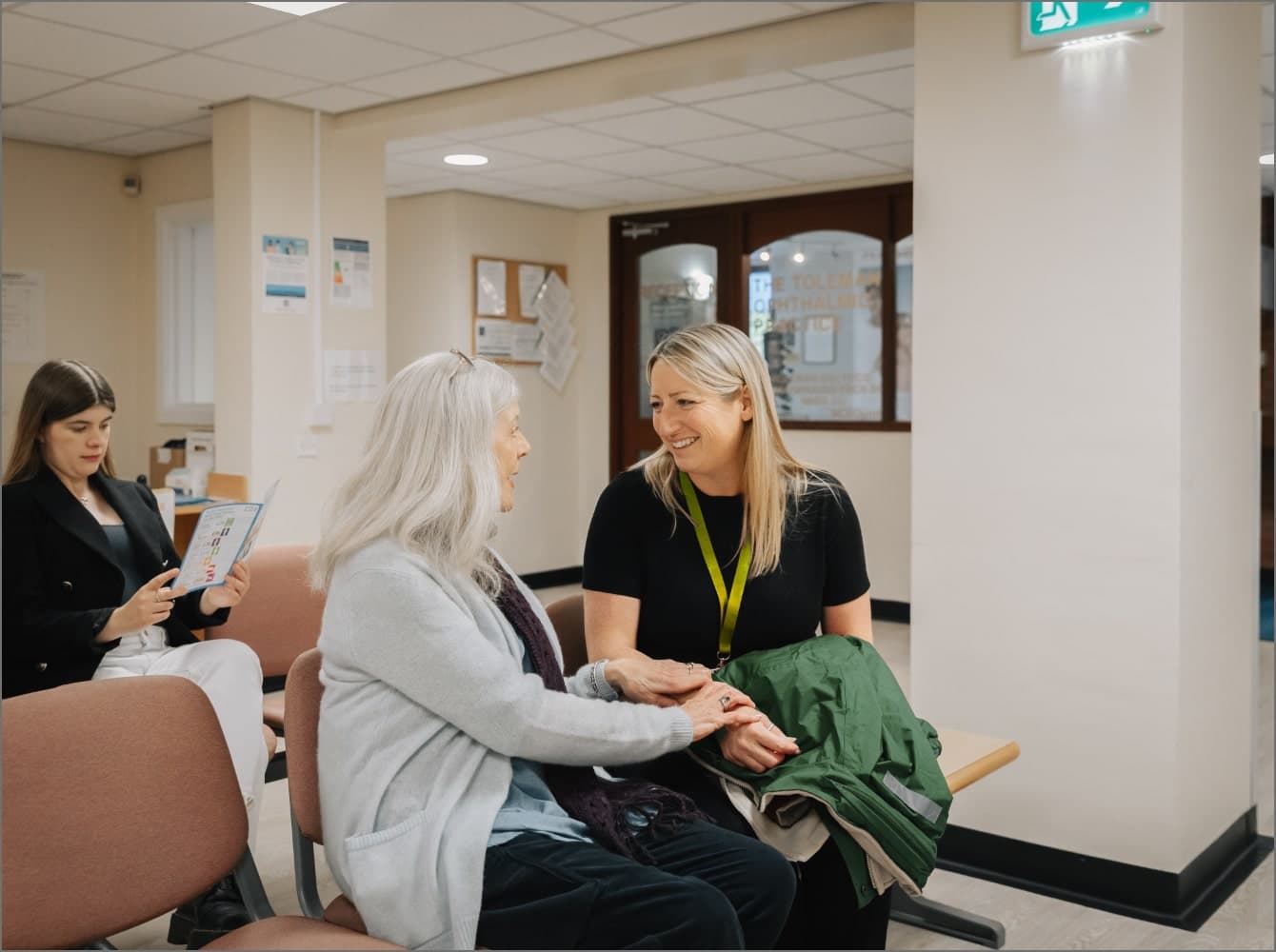
FAQs
- Which towns and postcodes do the Wimbledon & Kingston team service?
Our office provides care for people at home in the following areas:
Wimbledon, New Malden, Worcester Park, Tolworth, Surbiton, Norbiton, Wimbledon Park, Raynes Park, West Barnes, Old Malden, Merton Park, Berrylands, Motspur Park, Long Ditton, Copse Hill, Wimbledon Village, Merton, Coombe, South Wimbledon, Collier's Wood
If your town doesn’t appear above please check the postcodes below to see if we cover your area:
SW19 2, SW19 1, KT6 5, KT1 2, KT3 3, SW19 8, KT5 9, SW20 8, SW19 4, SW20 0, KT3 4, SW19 7, KT3 5, KT2 7, SW20 9, SW19 5, KT2 6, KT5 8, KT3 6, KT4 8, KT1 3, KT6 6, KT6 4, SW19 6, SW19 3, KT6 7, KT4 7
Search here if you cannot see your town or postcode - Is Home Instead Wimbledon & Kingston a locally owned home care organisation?
Home Instead Wimbledon & Kingston is one of 250 locally owned offices that collectively form Home Instead UK. Together, we care for 16,000 clients, delivering one million hours of home care each month. This unique combination of community-focused local offices and the resources of a national network enables us to provide personalised, relationship-led care while leading research and innovation that is transforming the experience of aging. Our services include companionship care, personal care, specialist care (including dementia, palliative, and Parkinson’s), and live-in care.
Search here if you cannot see your town or postcode - What are the benefits of dementia care at home?
With the right care and support, a person living with dementia can be as independent as possible. Dementia home care can enable them to live happily and securely in their own home, in familiar surroundings, surrounded by people they know.
- I have dementia / my loved one has dementia. Can you help me?
Yes. We understand how difficult it can be caring for someone living with dementia but we have years of experience in helping families cope with the situation at home. Our City & Guilds Assured dementia training programme ensures that our Care Professionals are fully equipped to provide exceptional care for individuals living with all types of dementia.
- What is the most common type of of dementia in the UK?
Alzheimer’s disease is the most common type of dementia, followed by Vascular dementia and then dementia with Lewy Bodies.
Discover More - What are some of the possible symptoms of dementia?
- Difficulties with problem solving
- Memory impairment
- Memory lapses
- Struggle to find words
- Difficulty processing information
- Difficulty making sense of what is seen
- Recognising people and places
- Changes in mood and behaviour
- Will my loved one have to give up their pet now they have been diagnosed with dementia?
When someone is diagnosed with dementia, it is often assumed that keeping their beloved pet is impossible. This is not necessarily the case. Studies have shown that pets have actually been known to increase the health of those with dementia while providing them with a friend to spend their time with. Owning a cute and cuddly companion can even be an essential part of their daily routine. Before jumping to any conclusions, it may be beneficial to review all of your options when it comes to this important decision.
An unexpected diagnosis can be frightening or difficult, and some might discover that they want their pet to remain by their side. After considering the following factors, you may find that there are other alternatives to immediately giving up a best friend.
Discover More - How can I help my loved one when they have dementia?
For people living with dementia and Alzheimer’s, lack of stimulation and boredom can be one of the most frustrating things. It’s important to provide activities that engage and bring pleasure to people living with Alzheimer’s and dementia.
Stimulating activities can help keep them in high spirits and prevent them from developing depression, whilst lessening anxiety and irritability.
Activities should aim to:
- Stir memories and allow them to reminisce about their life
- Foster emotional connections with others – contact with others is vital
- Encourage self-expression
- Make them feel more engaged with life
- Help them feel productive
- My loved one with Dementia has begun to develop aggressive behaviour, can you give me any advice?
If you have a relative with dementia – perhaps you are their carer – you may be aware that at some point you might find yourself dealing with aggressive behaviour from them. This is a prospect that many people fear, but there are ways to cope with such challenging behaviours.
Discover More - Are there warning signs that I or my loved one are getting dementia?
The early stages of dementia are not always obvious, and symptoms and problems might develop slowly. To add to these difficulties, early signs of Alzheimer’s and dementia are frequently easy to dismiss as a normal sign of ageing. However, if you know what to look out for, you can keep an eye on yourself and your loved ones and identify symptoms early. This will allow you to get the medical advice early on and work out care ahead of time.
Discover More - This is my loved ones first Christmas after being diagnosed with dementia, is there any advice you can give?
For a person with dementia, Christmas poses challenges that include disruption to a routine, confusing changes to décor and the layout of a home, and the pressure to be social over extended periods of time. When somebody’s memory or cognitive skills are deteriorating, they will find these tasks especially difficult; it is important that they are catered for in the most sensitive ways possible.
By looking at each potential challenge in turn, we have suggested some ways to manage these difficulties and have a successful Christmas without causing your loved one with dementia distress or exacerbating their confusion.
Discover More - What is the difference between dementia and Alzheimer’s disease?
There are many types of dementia. Alzheimer’s disease is simply one form of dementia.
Learn More - Where did the name ‘Alzheimer’s’ come from?
Dr. Alois Alzheimer is credited with discovering Alzheimer’s disease. Dr. Alzheimer was a well-known and popular German physician and researcher working in the early 1900s. Physicians and scientists at the time had a fascination with the human brain and were studying it to better understand how it worked.
Dr. Alzheimer met Auguste Deter, the first person who was diagnosed with Alzheimer’s. Auguste told Dr. Alzheimer, “I have forgotten myself”. He brought her to the doctor when she started to have memory loss and delusions. Dr. Alzheimer studied her for several years, noting her decline.
Because of Dr. Alzheimer’s discovery, the disease was named after him.
- I have Alzheimer’s disease/my loved one has Alzheimer’s disease. Can you help me?
Certainly. We know how challenging it can be caring for someone living with Alzheimer’s disease, however we have years of experience in helping families cope with the situation at home. Our City & Guilds Assured dementia training programme means our Care Professionals are trained to care for people living with all the different types of dementia.
Reach out and talk to the Wimbledon & Kingston team today
Enable your loved ones to continue to live their life with the support of the Wimbledon & Kingston team. If you would like to hear what clients say about us please take a peek at our Home Care verified reviews. If you would like more information about our high quality Dementia Care service, please call us on 0208 942 4137, or fill out the form below.
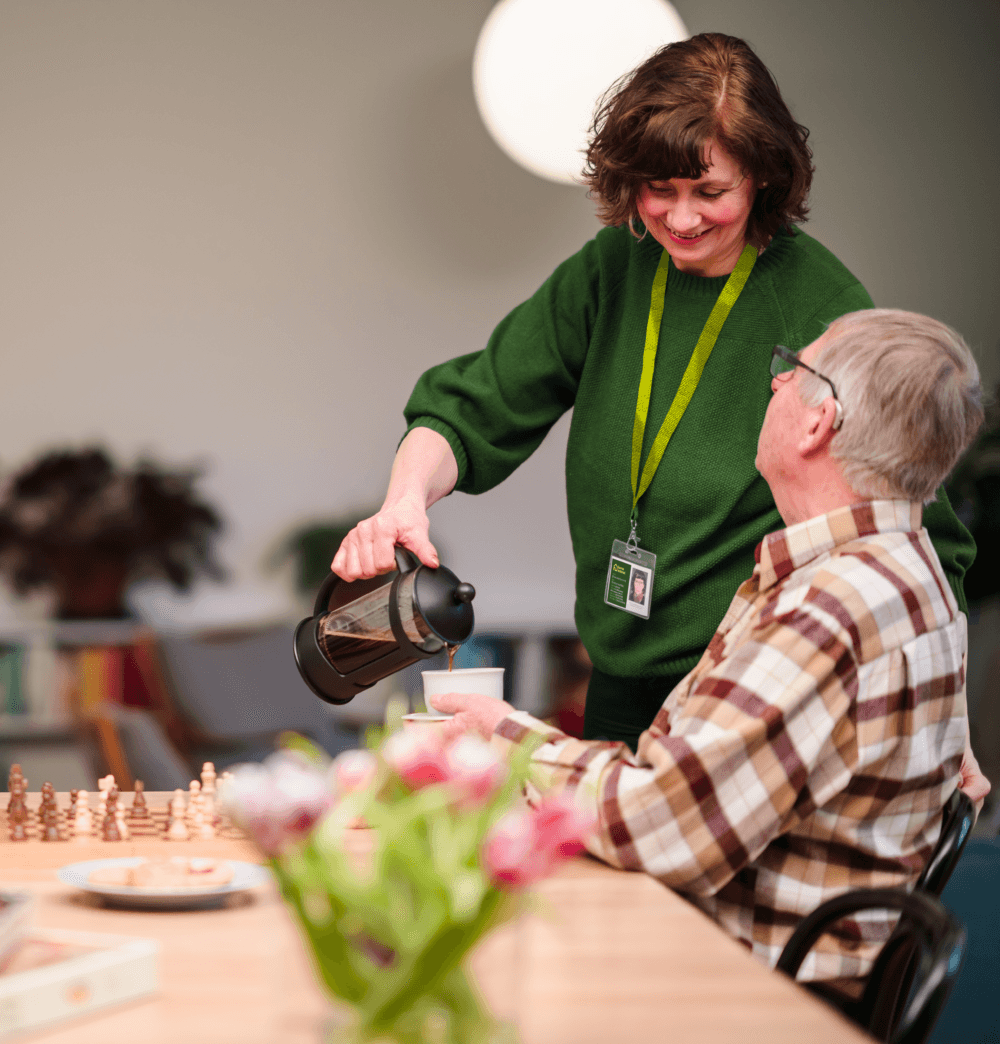
Become a Care Professional today
Make a world of difference to someone's life as you deliver outstanding care to keep our clients happy and thriving in their own homes.




